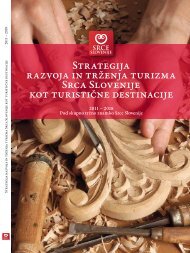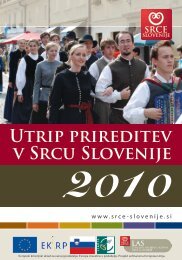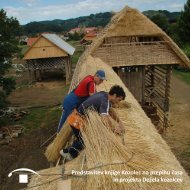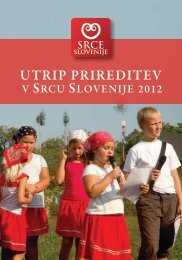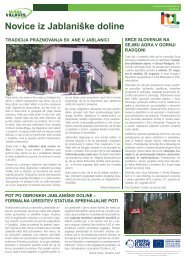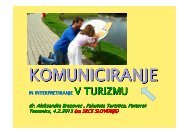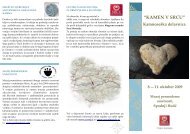Naše kulturno bogastvo - Razvojni center Srca Slovenije
Naše kulturno bogastvo - Razvojni center Srca Slovenije
Naše kulturno bogastvo - Razvojni center Srca Slovenije
- No tags were found...
You also want an ePaper? Increase the reach of your titles
YUMPU automatically turns print PDFs into web optimized ePapers that Google loves.
Puppet show entitled Mejaši(persons whose real estate properties borderon each other; translator’s note)Mejaši is an old puppet show whichwas usually played at weddings.It is quite unique and its equal isnot to be found among Europeanpuppetry. This is why we speak of atypical Slovenian-Kajkavian puppetform. It was also often staged in thearea of Šmartno near Litija, todayit is only put on stage on specialoccasions.The first professsional notes on puppetryin Slovenia appeared in 1941:they describe a puppet scene entitled“Lawsuit for the borderline” at Dravskopolje. Even as early as that time olderpeople told that that was an “old prank”at weddings. According to the storiestold by Ida Delšek’s father Gregor Pivec,born in 1928, who had seen the playseveral times, puppets appeared in Javorjeabove Bogenšperk during the firstyears following World War I. Puppets arecalled mejaši and in the surroundingsof Javorje they are also called “mlatiči”(threshers) since the players quarrel overthe borderline between their properties.The play was performed at weddingcelebrations by folk musicians who wereusually younger men. The following arethe stage props required for the play: abench, two blankets, two wooden sticks(dressed in two jackets) and a hat. At thebeginning one blanket is laid down andthe bench is placed on the blanket; underthe bench, a male actor lies down.The second blanket is used to coverthe bench from the top. Then the actorholds the bench with both hands andlegs. Two men cover the bench with thelower blanket and bring the bench onthe stage. They partly unfold the blanketand the actor descends down onto thefloor. Their hands (puppets) rest on thebench while he hides the legs underthe upper blanket. Everything but thepuppets is hidden. The puppets come tolife; each has a name, for instance Jožeand Miha. “What are you going to dotoday?” “I thought I would thresh. Willyou help me do some?” “You know I will,you are my neighbour, aren’t you? “Allright, let’s start.”They start threshing, the strokes can beheard: pi-ka po-ka. For a while everythinggoes smoothly and then a flail falls downhard on the neighbour. The latter beginsto complain about having been hit. Thefirst offers a pretext that he meant noharm and asks the neighbour that theycontinue working. After they have beenthreshing for some time the fight startsagain, only this time it gets much worse.A third person comes up to them, the socalledarbitrator: “What are you fightingabout?” They explain to him how thefight started and it turns out that theyhave had this dispute for quite some timeover a boundary stone which is supposedto be “on this side”, and Jože pounds thebench with his right hand. Each showshis own side of the border. The arbitratorgives judgement as to where the borderstone should be, and then they make upand keep on threshing. When they takeup the fight again it turns out that it is allabout the women: Miha is supposed tocast glances at Jože’s wife from time totime. Big words followed and in the endthey agree that Miha will leave Jože’s wifealone while Jože will give in with respectto the border stone. Thus they make upagain, shake hands and the play is over.The actor holds tight to the bench andthe two men carry him off the stage.One actor plays two roles (two neighbours)and another is an arbitrator. Firstuses different voices for the roles andthe audience does not know how manyactors there are under the bench. Thismakes the play even funnier. The namesof the characters were usually borrowedfrom nearby neighbours who haveactually had a dispute.Ida Dolšek, artistic director of the Culturaland Arts Society Folklore GroupJavorje, saw the play several times whenshe was a child and then brought itback to life by means of folklore groups.They gave a performance at the internationalmeeting of puppeteers inLjubljana in 1992. The play is very specialsince it cannot be seen anywhere else.Nowadays the Society stage the playwhen they give a performance as aguest theatre; however, they do wishthat the technique of playing would belearned by the young.19



